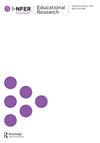把握教育研究中的教学差异:机遇与挑战
IF 2.6
3区 教育学
Q1 EDUCATION & EDUCATIONAL RESEARCH
引用次数: 2
摘要
摘要背景课堂内的教学差异涉及教育者对教学元素的调整,以满足不同学习者的需求。它通常被视为高质量教育的重要组成部分,促进所有学生获得平等和包容的机会。然而,定义和操作这种复杂的结构对于更好地理解教学差异和支持世界各地的学习者来说是具有挑战性的,也是重要的。目的本文旨在更好地理解教学差异。它讨论了教育研究文献中教学差异的定义和操作,并认为深思熟虑和适应性是教学差异的两个定义特征。证据来源和主要论点利用实证研究的理论论点和例证,包括我们自己的一项小规模研究,我们讨论并举例说明了在教学差异的实证研究中考虑深思熟虑和适应性的价值。此外,我们还考虑了教学差异化研究的挑战和机遇。结论研究教学变异的深思熟虑性和适应性需要概念和操作上的一致性,以及考虑教师和学生多角度的研究方法。我们的调查提请人们注意教学差异化的概念复杂性、实践中的挑战以及专业发展的必要性,以支持教师嵌入教学差异化实践。本文章由计算机程序翻译,如有差异,请以英文原文为准。
Capturing instructional differentiation in educational research: investigating opportunities and challenges
ABSTRACT Background Instructional differentiation within classrooms involves educators’ adaptations of instructional elements to meet diverse learners’ needs. It is usually regarded as a crucial component of high-quality education that promotes equal and inclusive opportunities for all students. However, defining and operationalising this complex construct is challenging, and important, in efforts to better understand instructional differentiation and support learners worldwide. Purpose This paper aims to contribute to a better understanding of instructional differentiation. It discusses definitions and operationalisations of instructional differentiation in the educational research literature and argues for the inclusion of deliberateness and adaptiveness as two defining characteristics of instructional differentiation. Sources of evidence and main arguments Using theoretical arguments and illustrations from empirical research, including a small-scale study of our own, we discuss and exemplify the value of considering deliberateness and adaptiveness in empirical research on instructional differentiation. Further, we consider the challenges and opportunities for research on instructional differentiation. Conclusions Studying the deliberateness and adaptiveness of instructional variation calls for conceptual and operational alignment, and research methodologies that take into account the multiple perspectives of teachers and students. Our investigations draw attention to the conceptual complexity of instructional differentiation, challenges in practice and the need for professional development to support teachers’ embedding of instructional differentiation practices.
求助全文
通过发布文献求助,成功后即可免费获取论文全文。
去求助
来源期刊

Educational Research
EDUCATION & EDUCATIONAL RESEARCH-
CiteScore
4.00
自引率
2.90%
发文量
0
期刊介绍:
Educational Research, the journal of the National Foundation for Educational Research (NFER), was established in 1958. Drawing upon research projects in universities and research centres worldwide, it is the leading international forum for informed thinking on issues of contemporary concern in education. The journal is of interest to academics, researchers and those people concerned with mediating research findings to policy makers and practitioners. Educational Research has a broad scope and contains research studies, reviews of research, discussion pieces, short reports and book reviews in all areas of the education field.
 求助内容:
求助内容: 应助结果提醒方式:
应助结果提醒方式:


